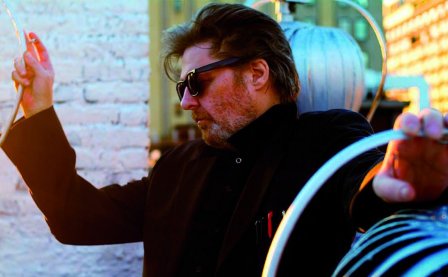Los Angeles is getting warm again. With small foreshadowing glimpses of Southern California’s spring-summer continuum wafting in, a certain sweaty, raw sound feels in vogue, if only for a beat or two. New York avant-rock band PC Worship enter with the sticky, drowsy, detached Buried Wish. It’s hot and careless, and it runs on diesel. Motivation drips off of Buried Wish like the strength to run in a dream: you keep falling to and through the ground, maybe your teeth are falling out too, I dunno.
Buried Wish rehearses apolitically through the music that leader Justin Frye and collaborators evoke across a 20-year divide. They mutate the framed nonsense and apathetic insight of The Melvins, Nirvana, Pavement, and Beck into something with a similar effect, however, offered to a different time and space in which apathy and non-expression are often not considered particularly radical or valuable traits. The think-piece and its world often operate under the presumptive judgement that art has an explicit moral and political obligation. This judgement isn’t necessarily wrong, but the notion that it is in fact presumed — that there are perhaps arguments to be made against it — is often overlooked.
Post-Trash writer Joshua Robbins thinks through the issue of political responsibility in a piece on Canadian indie-rock band Japandroids and their recent release Celebration Rock. Noting that the four years that have passed since Japandroids began making Celebration Rock have constituted a "post-Japandroids world," Robbins sees that many of the albums lyrics don't resonate with the American public's newfound state of general anxiety. Furthermore, they reflect the isolationism and self-interest that in some way lead to our differences. Ultimately, however, Robbins concludes that Celebration Rock is like a useful relic, a keepsake from when a self-interested way of life was more socially acceptable.
On the opposite pole sits PC Worship adding noise to the signal. PC Worship's noisy exploration of disassociation is moderately hedonistic, cruelly masochistic, and defiantly isolationist (stream the title track for a clue as to how). Yet still, in the end, Buried Wish is genuinely capable of relation.
The album opens with the hungover pearly-white-gates chorale of "Lifeless Rain on an Empty Moon" and quickly moves on to the suffocated indifference behind steady-chugger "Blank Touch." Here, the theme of lazy, syrupy lead guitar decorations and semi-psychedelic tape manipulations is established. This indifference to rock itself is well-felt until it fails to excite (or even emote) on the Sabbath-y stoner metal of "Back of My $$$," where heaviness is (however intentionally) undermined by lackluster drumming and a forcefully compressed mix. Novel riffs, caustic electronics, and dingy masculine (sur)realist half-rhymes ("A bag of leaves, the trash is spillin' out/ A bag of trash, I'm still in doubt") make up the body of Buried Wish, where meaning and intention fall apart. This comes to a head with "Flowers & Hunting,” a sort of funny acoustic moment in which lines like, “Reluctant and bored/ Trying to hoard/ Sequenced around the best meat in Nevada” are orchestrated by impromptu rises and falls in harmony, eventually finding cadence with the words “But I’m okay/ I’m okay.”
It’s clear that some self-distancing abstraction is at work here, but I’m reluctant to say that it reflects insincerity or ambivalence. Furthermore, I don’t want my judgement of Buried Wish’s affect as indifferent and dissociative to overshadow the fact that there are some real compositional niceties and aesthetic joys to be found. The album’s closing couplet of “Torched” and “Tranquil Pain” form a strangely hopeful passage with emancipatory moods alike The Velvet Underground’s “I’m Set Free” or “Jesus.” Frye delivers the odd cadence, “I’m goin’ through the trash/ Trying to find anything/ You might’ve thrown away/ ‘Cause you thought it caused you pain.” A pretty apt metaphor for the rummaging, thrifting, and collaging that serves Buried Wish and its oddly painless patchwork. This slow-burning jubilation continues until the ground slips away — unannounced — with the song’s closing lines, “I’ll go outside again/ And wait for the sun to hit/ Make all the prayers come true/ And try to swallow it.” Perhaps Buried Wish is simply the exportation of pain digested with hundreds of cigarettes and photos of trash, the projection of repressed hopes and frustrations upon a puritanical world.
On creative behavior much like this, Maggie Nelson quotes William Carlos Williams in her book The Art of Cruelty:
There is a ‘Puritanism’ — of which you hear, of course, but you have never felt it stinking all about you. […] It is an atrocious thing, a kind of mermaid with a corpse for a tail. Or it remains, a bad breath in the room. This THING, strange, inhuman, powerful, is like a relic of some died out tribe whose practices were revolting. … I wish to drag this THING out by itself to annihilate it.
“At times,” Nelson concludes, “it seems that such an annihilation would qualify as a blow of direct, ruthless compassion.”
More about: PC Worship




